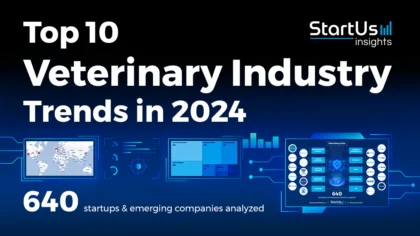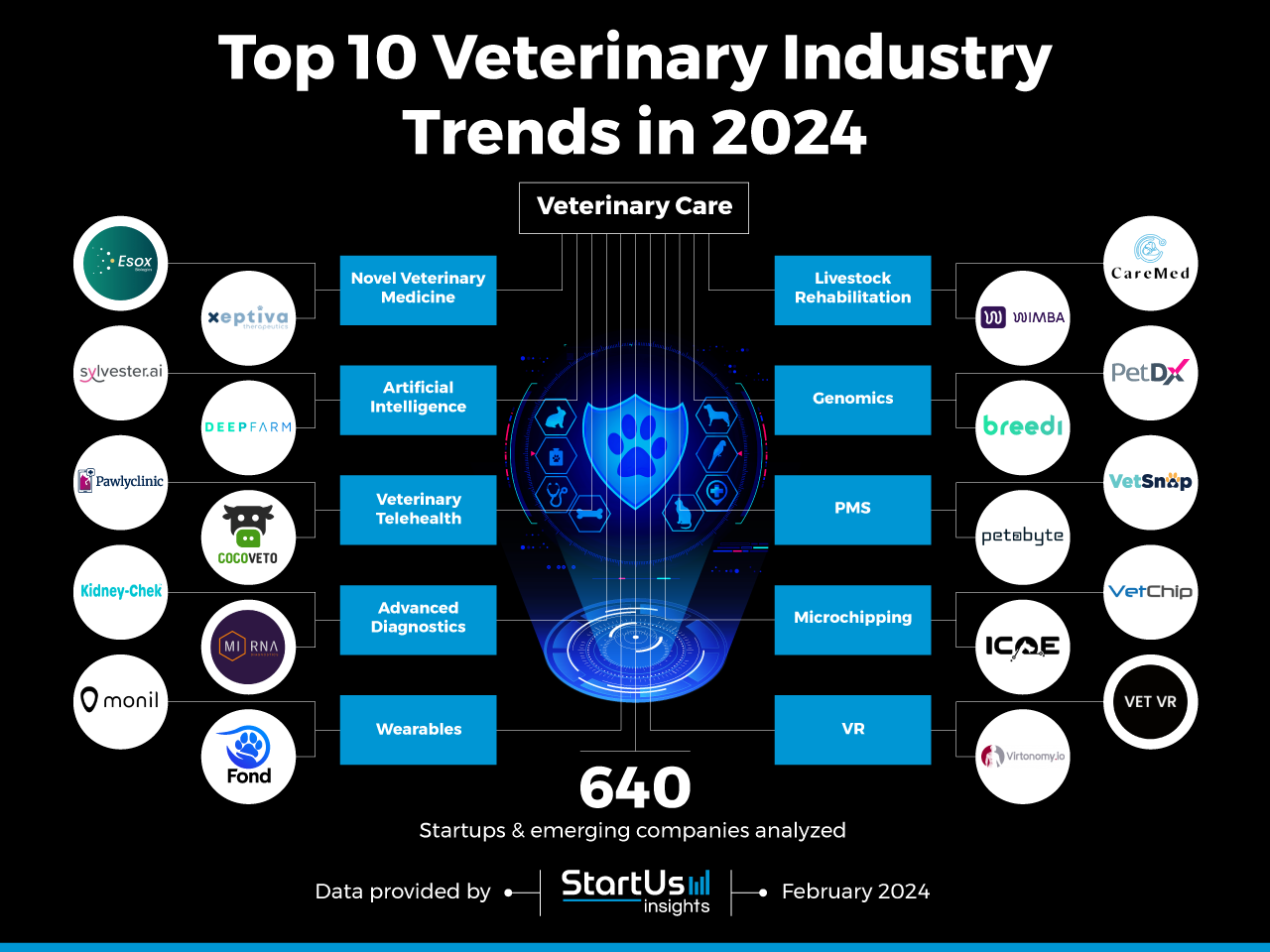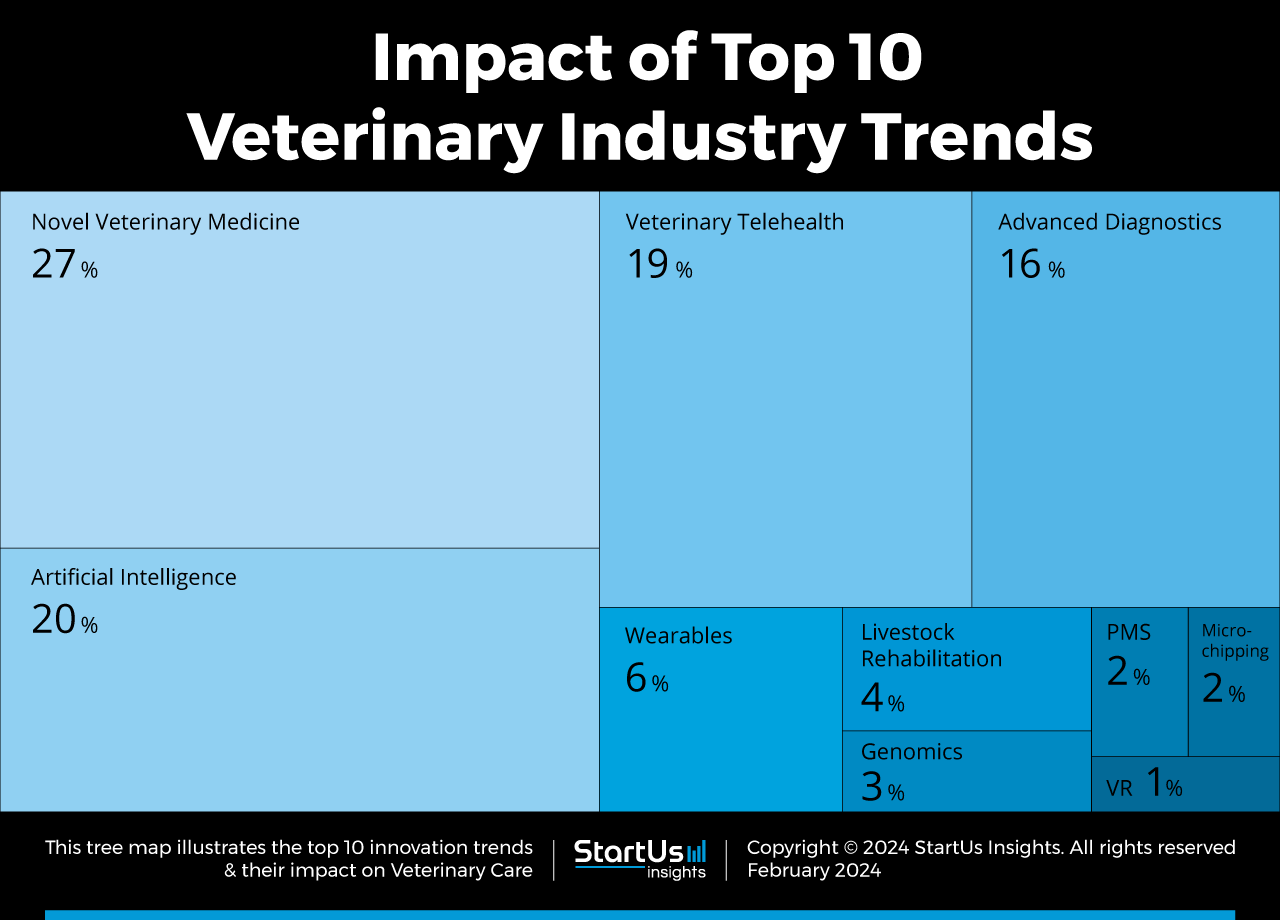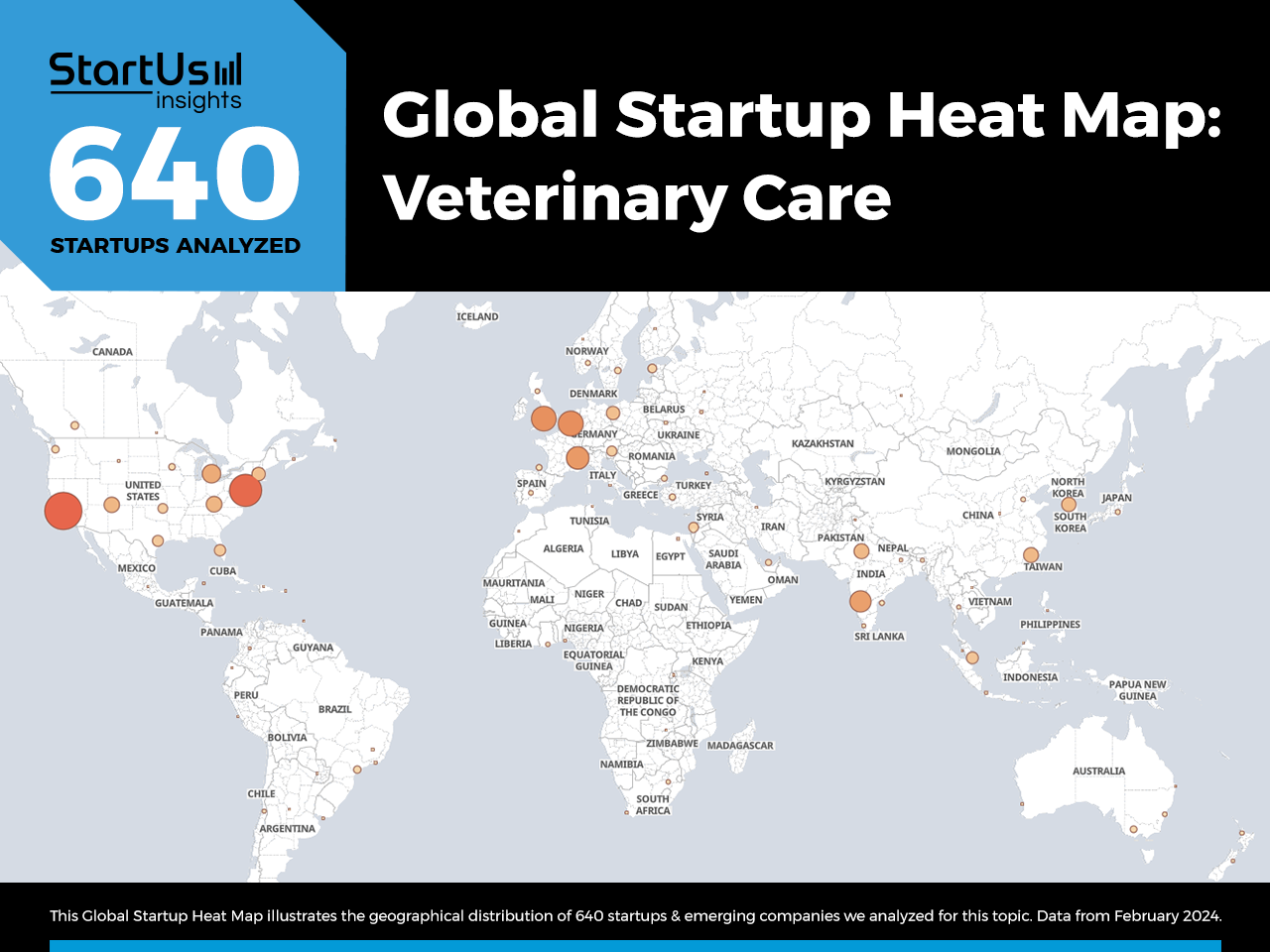Veterinary care is evolving into a sophisticated domain, paralleling human healthcare in its complexity and technological advancement. This discipline extends beyond the basic treatment of ailments, delving into intricate diagnostic procedures, advanced surgical techniques, and comprehensive preventive care strategies. Modern veterinary practice also leverages cutting-edge technologies such as digital imaging, telemedicine, and molecular diagnostics. These veterinary care trends enable practitioners to diagnose and treat a wide range of conditions with unprecedented precision.
Top 10 Veterinary Industry Trends in 2024
- Novel Veterinary Medicine
- Artificial Intelligence (AI)
- Veterinary Telehealth
- Advanced Diagnostics
- Wearables
- Livestock Rehabilitation
- Genomics
- Practice Management Systems (PMS)
- Microchipping
- Virtual Reality (VR)
Innovation Map outlines the Top 10 Veterinary Industry Trends & 20 Promising Startups
For this in-depth research on the Top Veterinary Industry Trends & Startups, we analyzed a sample of 640 global startups & scaleups. This data-driven research provides innovation intelligence that helps you improve strategic decision-making by giving you an overview of emerging technologies in the veterinary industry. In the Veterinary Industry Innovation Map, you get a comprehensive overview of the innovation trends & startups that impact your company.
These insights are derived by working with our Big Data & Artificial Intelligence-powered StartUs Insights Discovery Platform, covering 4 760 120+ startups & scaleups globally. As the world’s largest resource for data on emerging companies, the SaaS platform enables you to identify relevant technologies and industry trends quickly & exhaustively.
Tree Map reveals the Impact of the Top 10 Veterinary Industry Trends
Based on the Veterinary Industry Innovation Map, the Tree Map below illustrates the impact of the Top 10 Veterinary Care Trends in 2024. Novel veterinary medicine harnesses technological advancements to elevate animal health, while AI further transforms diagnostics and treatment methods. Telehealth services enable remote consultations, bringing expert care to distant locations. Advanced diagnostic techniques and genomics further unlock deeper insights into animal health, offering personalized care strategies.
Wearable technology ensures continuous health monitoring, while rehabilitation techniques incorporate advanced methods for animal recovery. Practice management systems streamline clinic operations, making administrative tasks run faster. Microchips provide secure and efficient animal identification, paralleling advancements in tracking technology. Lastly, VR emerges as an innovative tool in veterinary education and therapy, opening new dimensions in animal care training.
Global Startup Heat Map covers 640 Veterinary Industry Startups & Scaleups
The Global Startup Heat Map below highlights the global distribution of the 640 exemplary startups & scaleups that we analyzed for this research. Created through the StartUs Insights Discovery Platform, the Heat Map reveals high startup activity in the US and UK, followed by India.
Below, you get to meet 20 out of these 640 promising startups & scaleups as well as the solutions they develop. These 20 startups are hand-picked based on criteria such as founding year, location, funding raised & more. Depending on your specific needs, your top picks might look entirely different.
Interested in exploring all 600+ veterinary startups & scaleups?
10 Key Trends in the Veterinary Care (2024)
1. Novel Veterinary Medicine
Veterinary medicine encompasses a wide spectrum of healthcare services, from routine check-ups and vaccinations to surgical procedures and specialized treatments. For example, regenerative medicine techniques, like stem cell therapy and platelet-rich plasma (PRP), promote tissue repair and regeneration in animals.
Additionally, advances in laser therapy enable non-invasive treatment, aiding in tissue repair, pain reduction, and healing. It enhances cellular regeneration and blood circulation, accelerating animal recovery. Similarly, 3D printing provides custom prosthetics for improved animal mobility and realistic models for enhanced surgical training. Nanotechnology in cancer treatment also enables targeted drug delivery, where nanoparticles transport medication directly to cancer cells to enhance chemotherapy precision.
Esox Biologics offers a Biologic Therapy
UK-based startup Esox Biologics develops Aquabody, a biologic therapy designed for aquatic environments to prevent diseases. Tackling the overuse of antibiotics in aquaculture, Aquabody combats antimicrobial resistance and preserves beneficial microbes.
The startup also offers rapid pathogen detection via automated qPCR, genome sequencing for microbial threat identification, and metagenomic analysis for comprehensive microbiome insights.
Xeptiva Therapeutics provides a Chronic Neuroinflammation Treatment
Uruguayan startup Xeptiva Therapeutics offers recombinant multi-target immunogens targeting neurogenic inflammation. These immunogens, designed as conformational isomers, mimic immunogenic epitopes without the biological activity of inflammatory mediators. The vaccination elicits antibodies against key inflammation mediators like growth factors and interleukins. They reduce chronic inflammation and symptoms like pain and itching in pets.
Xeptiva Therapeutics’ product pipeline focuses on common pet ailments like osteoarthritis chronic pain and atopic dermatitis, improving the quality of life for aging pets. Its approach also emphasizes early detection and comprehensive treatment plans involving active owner participation. This enables personalized, effective pain management for companion animals.
2. Artificial Intelligence
Computer vision algorithms analyze radiographic images, ultrasounds, and pathology slides, aiding veterinarians detect diseases and abnormalities more accurately. Additionally, natural language processing (NLP) enables the conversion of speech or text notes into structured medical records, streamlining documentation. Also, it assists in analyzing animal communication by segmenting animal sounds into words and patterns.
Likewise, predictive analytics harnesses large datasets to forecast disease outbreaks in farms and optimize treatment plans. AI-driven telemedicine platforms facilitate remote consultations and monitoring, improving access to veterinary expertise. Lastly, machine learning algorithms aid in identifying genetic predispositions and optimizing breeding practices.
Sylvester.AI enables Facial Cues-based Pain Analysis
Canadian startup Sylvester.AI makes Tably, an AI-powered API that interprets cats’ facial cues to assess their pain levels. Trained on vet-approved pain scales, it analyzes key facial indicators like ear position and muzzle tension from photos. Moreover, the API utilizes various AI techniques, including object detection, image suitability detection, object extraction, image categorization, and result analysis.
To ensure accuracy, the company’s algorithm first verifies the presence of a feline face in the image and only then proceeds to a more detailed AI analysis. This step minimizes errors and enhances the reliability of the results. The tool also aids in post-procedure care and ongoing health monitoring, providing cat owners and veterinarians with precise, reliable insights. This improves feline healthcare management, both in-clinic and remotely.
DeepFarm facilitates Cattle Behavior Tracking
South Korean startup DeepFarm combines AI and animal science to innovate in the farming and livestock sector. Its AFA (AI for Animal) solution monitors and tracks cattle behavior. This AI-driven system provides real-time data notifications to farmers and managers, enabling the prediction and prevention of various issues associated with cattle rearing and management.
AFA also operates autonomously through embedded devices with cameras, eliminating the need for server-based image data analysis. This non-intrusive, stress-free approach improves farm productivity and aids in identifying and monitoring livestock behavior effectively.
3. Veterinary Telehealth
Telehealth in veterinary care encompasses remote consultations, diagnostics, follow-up care, prescription management, and more. The integration of high-quality video conferencing tools further allows vets to observe and diagnose pets in real time. This benefits routine check-ups of the animals or initial assessments of non-critical conditions.
Moreover, AI and machine learning algorithms enhance telehealth services to assist in preliminary diagnostics and symptom analysis. These technologies provide veterinarians with valuable pre-consultation data, enabling more efficient and targeted virtual visits. Additionally, telehealth platforms offer features like digital prescriptions and access to electronic health records (EHRs) to streamline the care process.
Pawlyclinic enhances In-Clinic Veterinary Services
Singaporean startup Pawlyclinic provides a platform for veterinarians to provide comprehensive care remotely. For example, it provides flexible work scheduling and digital storage, increases client interaction, and simplifies the review of medical records. Also, the platform offers medication prescription and delivery, as well as referrals for in-clinic care and diagnostic tests.
This way, the platform enhances in-clinic veterinary services and empowers pet parents to better manage their pets’ health conveniently. In cases where teleconsultation is not suitable, vets refer pet parents to the startup’s network of clinics, ensuring seamless and continuous care.
CocoVeto builds a Farm Animals Telemedicine App
France-based startup CocoVeto develops an app, CocoFeed, for breeders and rural veterinarians. It utilizes AI to address veterinarian scarcity and assist breeders in their transition processes. The app enables rapid response and provides thematic sheets on animal feed prevention, enhancing knowledge transfer to farmers. The agroecological-committed app further reduces production losses and offers enhanced support.
CocoVeto also offers a virtual assistant and video-conferencing service, accelerating pathology treatment. These solutions ensure legal security in breeder-veterinarian exchanges, simplify health monitoring, and support innovative approaches in agricultural management. For breeders, the app reduces mortality through prevention, aids knowledge acquisition, and increases livestock income.
4. Advanced Diagnostics
The integration of precision imaging and molecular diagnostics in advanced diagnostics offers advanced tools for accurate and swift diagnoses. Precision imaging, which includes digital radiography, ultrasonography, and CT scans, allows veterinarians to visually assess an animal’s internal health with remarkable clarity. Digital radiography detects bone and joint issues while ultrasonography examines soft tissues and CT scans reveal intricate details of the brain and spine.
Complementing this, molecular diagnostics delves into the genetic level and identifies pathogens and genetic mutations. PCR effectively pinpoints diseases like parvovirus and Lyme disease, while next-generation sequencing (NGS) aids in understanding complex conditions such as canine influenza. Biomarkers also serve as measurable indicators of biological states or processes, playing a crucial role in diagnostics, monitoring treatment effectiveness, and predicting disease progression.
Kidney-Chek aids in Kidney Issues Detection
Canadian startup Kidney-Chek offers a saliva test that measures salivary urea to identify potential kidney issues. The diagnostic tool changes color to signal health concerns, allowing for timely veterinary intervention. The startup also detects severe dehydration and other health issues. The tests can be performed at home with a mouth swab, providing results within minutes.
MI:RNA Diagnostics advances Animal Health Screening
UK-based MI:RNA Diagnostics develops two solutions – NEMO Johne’s Disease Screening for cattle and NEMO Cardiac Health Screening for cats and dogs. The Johne’s Disease Screening solution employs AI and statistical modeling to detect cattle in the pre-shedding or pre-clinical stage of Johne’s disease from blood samples. Moreover, it allows vet doctors to better understand the resilience of the disease to protect the herd.
Its cardiac health screening solution for cats and dogs also identifies early-stage heart disease from a blood sample. For this, it utilizes miRNA profiling for precise diagnosis and management of conditions like myxomatous mitral valve disease (MMVD) in dogs and hypertrophic cardiomyopathy in cats. With high accuracy, sensitivity, and specificity, the startup offers an effective solution for early detection, breed screening, and pre-anesthetic evaluation.
5. Wearables
Wearables revolutionize pet health management with a suite of advanced technologies. Global positioning system (GPS) trackers ensure pet safety by monitoring their location, while activity trackers assess physical exercise levels. Health monitoring wearables also track vital signs, aiding early disease detection. Further, behavioral analysis tools in these devices support identifying issues like anxiety, and integration with telehealth allows vets to monitor health remotely.
RFID chips in wearables further facilitate quick pet identification while smart collars with environmental sensors monitor critical conditions for health-sensitive pets. Additionally, diet trackers assist in managing nutrition by providing medication reminders to ensure timely treatments. These innovations provide valuable data for veterinarians, leading to tailored and effective care.
Monil simplifies Animal Health Monitoring
Norwegian startup Monil aids in cattle farming with its virtual fencing system. The startup’s technology enhances animal health monitoring, simplifies pasture management, and ensures efficient use of land. Its system includes a mobile app and a collar (the “clave”) that allows farmers to set up virtual fences to establish grazing boundaries. This enables farmers to track animal movements in real time and receive instant alerts on any irregularities.
The startup enables farmers to better understand the grazing patterns and have a know-how of animal health and behavior. Further, Monil’s app offers insights into the well-being, activity levels, and estrus cycles of livestock. This aligns with the growing demand for sustainable, efficient farming practices that prioritize animal welfare and environmental stewardship.
Fond Solutions streamlines Animal Habit Tracking
Indian startup Fond Solutions offers FlufFit which allows pet owners to monitor and manage dogs’ activities by tracking their walking, playing, and sleeping habits to understand their sleep patterns with ease. Equipped with patent-pending technology, FlufFit measures the dogs’ body temperature and assists in effective weight management. The device also connects the dogs to veterinarians, delivering health insights for proactive care.
This healthcare device translates complex data into simple daily insights accessible via a connected app. As a result, it enables pet owners to better understand the physical and emotional health of dogs. The app also sets personalized fitness goals based on the dog’s breed, weight, and age, addressing the common issue of pet obesity. Fond offers features like activity and sleep quality tracking, and vet-reviewed insights to prevent diseases.

6. Livestock Rehabilitation
In veterinary rehabilitation, innovative technologies play a key role in enhancing animal recovery and health. For instance, hydrotherapy offers low-impact exercise in water, aiding in joint stress relief and mobility improvement. This is beneficial for post-surgery recovery or arthritis.
Electrical stimulation therapy also supports muscle strength and pain management, useful for animals combating muscle atrophy. Additionally, the use of custom orthotics, prosthetics, and various assistive devices enables animals with disabilities or post-amputation to move more easily, ensuring a better quality of life.
Caremed advances Shock Wave Lithotripsy for Urinary Stone Removal
Turkish startup Caremed provides PetLith, a urinary stone removal tech for animals. It utilizes an animal-specific extracorporeal shock wave lithotripsy system that features advanced robotic electrohydraulic therapy. This non-invasive, pain-free solution breaks down urinary stones in animals, offering a high level of precision and tissue protection during treatment.
Compatible with various X-ray and ultrasound systems, the system allows for accurate stone localization and tracking. PetLith’s collaborative robot arm further ensures precise targeting. PetLith‘s user-friendly design, economical operation, and quick treatment times make it an efficient and cost-effective choice for veterinary lithotripsy.
Wimba offers 4D-printed Orthopedic Products for Animals
Polish startup Wimba offers V-OP, a range of 4D-printed orthopedic products for animals. For instance, its carpus orthosis supports wrist joints and tarsus orthosis supports the ankle. These products use the Wimba Therapy System which features adjustable fastening systems and a controlled motion and rehabilitation monitoring component.
The startup also has a WimbaSCAN smartphone app that simplifies measurement collection for plaster casts and bands. Wimba Boots shields animals’ paws from extreme temperatures and harmful elements like road salt, snow, and debris. Wimba Prostheses for limbs further provides a balanced and biomechanically sound solution for pets with limb impairments. Wimba’s products thus address various animal conditions, from degenerative diseases to injuries.
7. Genomics
Veterinary genomics evolves with technologies like NGS for detailed animal genome analysis and CRISPR-Cas9 for precise gene editing. This is crucial for identifying disease markers and developing therapies. Single-cell sequencing also offers granular insights at the cellular level, enhancing disease understanding.
Further, the field embraces epigenetics to study gene expression changes due to environmental factors, and metagenomics for insights into animal microbiomes. Transcriptomics deepens understanding of gene functions and regulation. These advancements, supported by bioinformatics, AI, and cloud computing, drive significant progress in personalized veterinary medicine and disease prevention.
PetDx offers a Liquid Biopsy Test
US-based startup PetDx develops OncoK9, a liquid biopsy test that uses NGS for early multi-cancer detection (MCED) in dogs. It employs advanced genomic analysis and proprietary bioinformatics algorithms to detect cancer signals from a blood draw. Performed at PetDx’s ISO-certified lab in San Diego, OncoK9 uses Illumina NovaSeq 6000 instruments for its complex testing.
The OncoK9 test process involves collecting a blood sample containing cell-free DNA from healthy and potentially cancerous cells. The sample undergoes centrifugation to separate its components, followed by extraction and sequencing of cell-free DNA. PetDx’s specialized bioinformatics algorithms then analyze the data to identify cancer-associated genomic alterations. The final step is a clinical report sent to the veterinarian, to detect canine cancer early on.
Breedi specializes in Genetic Testing & Selection
Dutch startup Breedi offers genetic testing and genomic selection, including full-cycle genetic testing with estimated breeding value (EBV) and genomic breeding value (GBV). The service enhances farm profitability by improving animal productivity, fertility, and longevity. Additionally, it provides breeding centers with verified pedigrees and breeding tools. The service encompasses genotyping, productivity and health prediction, disease carrier detection, and inbreeding control, using advanced algorithms for breeding value calculation.
The startup also provides extensive support and training for staff in genomic selection, sampling techniques, and data utilization. Thus, it ensures optimal use of genetic potential and effective herd management strategies. Its user-friendly online tool integrates with herd management software, offering accessible analytics, animal rankings, and breeding decision aids.
8. Practice Management Systems
The latest technologies in veterinary practice management systems center around enhancing efficiency and data accessibility. Cloud-based systems offer secure, remote access to patient records and practice data from any location. Integration with telemedicine platforms also becomes increasingly common, allowing seamless digital consultations and patient monitoring.
AI and machine learning advance data analytics, enabling predictive health insights and personalized treatment plans. Blockchain also emerges as a solution for secure, tamper-proof record-keeping, ensuring data integrity. Additionally, mobile app integration facilitates better communication with pet owners and appointment scheduling. These innovations streamline patient care and clinic operations.
VetSnap develops Controlled Drug Log Software
US-based startup VetSnap advances DEA compliance for veterinary practices with its digital controlled drug log software. This cloud-based solution transforms the traditional paper logbook into an automated, error-reducing system that integrates with PMS. It also simplifies inventory management by automatically flagging log errors, reconciling inventory levels, and integrating patient and client data. Accessible on any browser or mobile device, VetSnap’s software eliminates the need for hardware and tedious software upgrades.
Key features of the software include efficient and controlled drug inventory management, real-time inventory breakdown, simplified logging and invoicing processes, and automated overnight drug log reconciliation with next-day fixes. It also streamlines audit preparations with comprehensive DEA compliance reports and log entries, providing fast, printable records for auditors.
Petabyte offers Cloud-based Veterinary Practice Management
US-based Petabyte provides a veterinary practice management solution that offers actionable insights to improve productivity and patient care. The cloud-based software consolidates and analyzes data from the practice management system, marketing, CRM, ERP, and more. It cleanses, consolidates, and standardizes data utilizing a digital directory, AAHA accounting codes, and proprietary algorithms. The software then converts it into a secure, encrypted asset accessible only to the user.
Built-in dashboards and custom reporting tools further empower the teams with location-specific or practice-wide visibility. Additionally, the report builder feature monitors KPIs, schedules emailed reports, and set alerts to share insights. For enterprise-level analytics, Petabyte audits new acquisitions, generates custom reports, and leverages the full capabilities on demand.
9. Microchipping
The field of veterinary microchipping has seen significant technological advancements recently. The smaller and more comfortable microchips are enhancing data storage and retrieval capabilities. Integration with GPS further allows pet owners to track their pets’ location in real time. The application of advanced encryption methods in these chips also protects the stored data against unauthorized access.
Some microchips now come with temperature-sensing capabilities, providing vital health information. Additionally, the use of biocompatible materials minimizes the risk of rejection or allergic reactions. These innovations make microchipping more effective for identification, health monitoring, and ensuring pet safety.
VetChip manufactures a Biosensing Microchip
Australian startup VetChip develops a biosensing microchip for continuous health monitoring. Implanted under the animal’s skin, it tracks key biometric indicators like temperature, heart rate, respiratory rate, and oxygenation levels. The owner’s smartphone wirelessly receives this data which the proprietary AI software analyzes to detect any health abnormalities. Owners receive automatic alerts about unusual health changes, thus enabling timely intervention.
The company’s microchip also includes a location monitoring feature, making it a valuable tool for farming and agriculture. It integrates with smart farming practices, enhancing biosecurity, early disease detection, animal welfare, and yield optimization. VetChip’s proactive health monitoring system thus ensures early intervention for improved animal health outcomes and disease management.
ICOE Pet provides Ultra-Wideband (UWB) Location Tracking
US-based startup ICOE Pet makes a microchip compatible with smartphones and existing scanners. It offers advanced features like real-time tracking, temperature monitoring, and heartbeat measurement. With smartphone scanning and ultra-wideband tracking, farmers reduce prolonged separation when the animals go missing.
Designed for a range of applications, the microchip enhances safety and health monitoring for pets, livestock, zoo animals, and wildlife. For instance, it facilitates remote health assessments in zoos and streamlines livestock management with automated counting and health alerts. Further, the company’s microchip aids in preventing human-wildlife conflicts and enhances the safety of marine life like manatees against boat strikes.
10. Virtual Reality
VR-powered immersive 3D simulations allow students and professionals to study realistic surgical and diagnostic scenarios without live animals for veterinary training. VR also assists client education by demonstrating complex medical conditions and treatments in an interactive environment.
VR finds applications in animal rehabilitation, providing engaging environments for therapy and recovery. These developments improve educational and therapeutic outcomes and pave the way for more compassionate and effective veterinary care.
VET VR simplifies Animal Anatomy Study
Latvian startup VET VR allows students to learn animal anatomy through VR, offering an immersive and interactive 3D educational experience. This technology allows users to explore detailed models of animal structures, from bones and muscles to internal organs, enhancing comprehension and retention.
The startup’s VR solution also allows learners to select and learn about specific anatomical parts with pop-ups, realistic virtual models, and model manipulation. Additionally, VET VR provides a VR training environment for veterinary procedures like TPLO surgery, allowing doctors to practice and repeat surgical steps in a life-like, risk-free setting. This learning tool enhances visual memory and offers a comprehensive, hands-on learning experience.
Virtonomy advances Digital Twin-based In-silico Trials
German startup Virtonomy develops a digital twin solution, v-Patients, providing an alternative to traditional in vivo and in vitro testing. Its database includes virtual human and animal patients derived from real CT scans. The solution further allows for the selection of specific populations based on various criteria such as disease, age, sex, and ethnicity.
Moreover, it features advanced 3D visualization, interactive implantation, accurate measurements, and statistical shape models for analyzing different demographic groups and identifying worst-case anatomies. These features aid in device design optimization, virtual patient cohort analysis, statistical population analysis, and more.
Discover all Veterinary Trends, Technologies & Startups
Technological advances in veterinary care revolutionize the diagnosis, treatment, and prevention of animal diseases. Wearable tech devices enable continuous monitoring of pet health, alerting to potential issues. AI-driven tools assist in efficient disease diagnosis and predict health risks based on breed and medical history. Likewise, advances in pharmacology enhance disease management. These technologies significantly improve veterinary care, offering tailored solutions and proactive health management for animals.
The Veterinary Industry Trends & Startups outlined in this report only scratch the surface of trends that we identified during our data-driven innovation & startup scouting process. Identifying new opportunities & emerging technologies to implement into your business goes a long way in gaining a competitive advantage.











